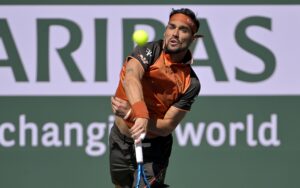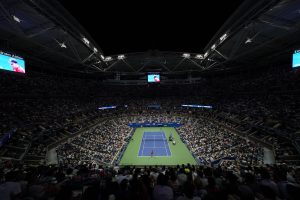2016 has proven to be a breakout year for Lucas Pouille. The Frenchman was ranked 78 at the start of the year, but now after back to back Grand Slam quarterfinals and a maiden title in Metz, the 22-year-old sits at 16 in the world with a possibility of ending the year inside the top 10.
Despite being very talented from a young age, Pouille’s slow climb up the rankings has meant he has flown under the radar compared to many of the other young talents on tour. Whilst the likes of Nick Kyrgios, Dominic Thiem, and Alexander Zverev were ascending the rankings with big results, Pouille was gradually improving year on year, and now that hard work is paying off.
Why Lucas Pouille is the Best Young Player on Tour
The world #16’s sudden rise has surprised many as he was unable to produce the results on the Challenger tour. His runs in Rome and Wimbledon were seen as “flukes” and “lucky” because they came out of nowhere, but he has since gone a long way into proving those claims to be false. At the US Open, Pouille produced the biggest performance of his young career by defeating Rafael Nadal in a five set thriller at the US Open. His year continued to get better as the Frenchman returned to his native country to capture his first ATP title in Metz the past weekend. The world now knows the talents of Pouille, and it will be interesting to follow his career in the coming years, but there is one thing that he has proven to me, he is the best young player out there.
What separates Pouille from the likes of Thiem, Kyrgios, Zverev and the other young players out there is the completeness of his game. Whilst the Frenchman might not have the flashiness of the Aussie, the power of the Austrian, or the serve of the German, he lacks any real weakness in his game. The modern era requires players to be more complete than ever. Gone are the days you can win multiple Grand Slams with one signature style, you have to combine them all into one complete player, and it is those players who can put it all together than ascend to the top.
Pouille lacks any real weakness in his game. He is very good everywhere, from the serve to the groundstrokes to the net, there is not one area in the game where Pouille feels uncomfortable. If you look at Thiem, he seems to lack defensively and often makes poor choices. Kyrgios’s defence, return and backhand can be seen as weaknesses in his game. Zverev is similar with his defence, though he is only 19 with plenty of room to grow.
Pouille combines all the strokes with great mental strength and desire, something that other French hopes failed to do. He fights hard and steps up in the big matches, as evident by his performance against Nadal at the US Open. Being a break down in the final set against one of the greatest of all time would signal defeat for many, but Pouille continued to fight and he reaped the rewards as he was able to come back and force a tiebreak. From there the Frenchman showed his mental toughness by out-clutching the 14 time Grand Slam champion–impressive stuff. Compare that to the players mentioned in this article, and you can see the difference. Thiem is prone to nerves, Kyrgios lacks the desire, and Zverev can often get frustrated when things are not going his way.
The scary thing is that there’s still plenty of room for improvement. Whilst he is very good at everything, Pouille does not excel at one particular area just yet. If he can develop a signature weapon, then we have a future Grand Slam champion on our hands, that is, of course, providing he can handle the pressure.
Main Image:





